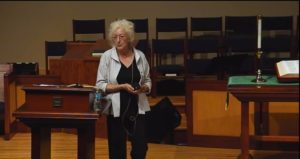

I highly appreciate the talk given by Lesley Hazleton, but I have the following remarks to offer:
1- In this context, it's inaccurate for the speaker to mention Saudi Salafis and Wahabis while describing fundamentalists without mentioning the Safawi Shi'ite of Iran who burned Iranian Sunnis to death if they refused to accept conversion to Shi'ite sect (watch minutes 20:55 to 21:10 and 56:50 to 57:00). Media and experts consciously or unconsciously tend to mention the Saudi example alone, which is inaccurate.
2- Sunni Muslims believe that a Persian non-Muslim assassinated Umar, the second Khalif. But, unlike Shi'ite Muslims, you don't find Sunnis or Arabs crying his death every year, calling to hate the persians or calling for revenge from Persians. Seems to me, Sunni Muslims have succeeded to forgive by "abandoning all hope for a perfect past". Obviously, Sunnis have chosen to live with the past while Shi'ite have chosen not to.
3- It's important to record that Imam Ali, may peace be upon him, was assassinated after he agreed to a truce that put an end to long division and wars among the muslim community by splitting the Khalifat between him in Iraq and Muaweah in Damascus. In fact, the Khawarij, who assassinated Ali, were a radical group and an off shot of Imam Ali's followers who didn't consider the truce Godly. For the same reason, Khawarij also tried but failed to assassinate Muaweah. Soon after Imam Ali's assassination, his Son Hasan, may peace be upon him, stepped down willingly and recognized Muaweah as his Khalif, resulting in the re-unification of the Islamic world under Muaweah's leadership.
4- The dramatic description offered by the speaker for the disturbing murder of Husain and his companions, may Allah bless him, is the description that radical Shi'ite teaches. The speaker should have also touched the description that moderate Shi'ite clerics teach, which is much less dramatic and very much close to that of Sunni's.
5- It's not entirely true that Sunnis don't know the story of how husain was murdered (watch minutes 52:35 to 52:50 and 1:15:50 to 1:16:15) Sunnis know about Hussain's murder as much as they know about Khalifs Umar, Uthman and Ali's assassinations. Out of respect, Sunni Muslims ignore all hateful drama and fairytales narrated by Shi'ite Muslims when they mourn Husain during the month of Muharram. Sunni Muslims avoid attending such ceremonies that are not free from abusive words against the first three Khalifs of islam and calls for revenge from murderers of Husain! Who could they possibly mean other than ordinary Sunni Muslims? Sunnis have learned to live with this past while Shi'ite haven't.
6- Assasinaion of three out of four first Khalifs of Islam is tragic but doesn't make their period less "perfect" (watch minutes 57:00 to 58:00).
7- Fundamentally, Sunnis and Shi'ite differ in selecting the successors of the prophet Mohamed, may peace and blessing of Allah be upon him. While Sunnis believe in Shooraa (شُورَى/consultation) followed by Bayaa (بَيْعَه/pledge of loyalty), Shi'ite don't recognize the consultation process but believe that succession is restricted within the family of the prophet, may peace and blessing of Allah be upon him. Therefore, unlike Sunnis, not only Shi'ite don't recognize the first three successors of the prophet (Khalifs), they consider them aggressors and hypocrites. Therefore, Shi'ite seek salvation through cursing and verbally abusing the first three Khalifs publicly as well as the vast majority of prophet's 120,000 companions who offered pledge of loyalty to the first three successors.
8- Suicide bombing of Shi'ite shrin in Karbalah was attributed by the speaker to Sunni extremists (watch minutes 14:30 to 14:50), which is not proven and remains to be only a speculation. In fact, findings strongly suggest that Shi'ite groups aligned with Iran have committed many attacks on Iraqi Shi'ite for political gains. Replacing the moderate Iraqi Shi'ite islam with the radical Iranian shi'ite Islam prompted the Iranian regime to promote divisiveness between the peaceful Shi'ite-Sunni Iraqi fabric. This divide is essential for the full control of the radical Iranian regime over Iraq. Yes, attacks have not been by Sunnis on Shi'ite and shi'ite on Sunni only as presented by the speaker (watch minutes 16:45 to 17:05). Here is a link to an eye witness on Shi'ite-Shi'ite attacks:
https://youtu.be/zxIV4v2nF_M
In fact, this divide and rule strategy could be used to better understand the Sunni Islam narrative that teaches conspiracies and hidden political agendas of Non-Arab Muslim being the root cause that lead to:
(A) Assassination of three Khalifs (second to fourth).
(B) Unfortunate battles between the companions of prophet, may peace and blessing of Allah be upon him, such as Jamal battle.
(C) Creation of the current dramatic, hateful and divisive Shi'ite sect that is based on distorted history.
https://youtu.be/sD5BxF83mJA


